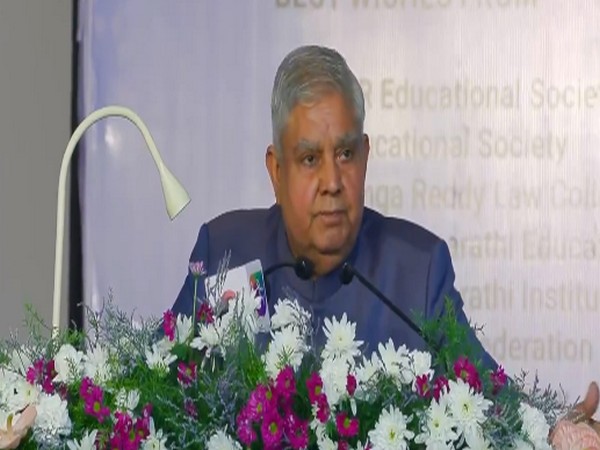Vice-President of India Jagdeep Dhankhar on Tuesday said that the new criminal laws passed by the Parliament have unshackled the Indian criminal justice system from the colonial legacy while keeping the focus on justice rather than punishment.
“Just a few days ago, three new criminal law bills received the assent of the President of India. The new laws have unshackled the Indian criminal justice system from the colonial legacy while keeping the focus on justice rather than punishment,” Dhankhar said.
Dhankhar was speaking after releasing a special postal cover to celebrate the 100th anniversary of legal luminary late Justice Konda Madhav Reddy at a college in Hyderabad on Tuesday.
The programme was presided over by Dr Tamilisai Soundararajan, Governor of Telangana and Lt Governor of Puducherry.
“Friends, it (the passage of the laws) marks a monumental, revolutionary change from Dand Vidhan to Nyaya Vidhan,” he added.
Asserting that all three organs – the Judiciary, the Executive and the Legislature are performing commendably and catalyzing the unprecedented rise of the country, Dhankhar said that the legal landscape of the country has been undergoing a great affirmative change in recent months, which will have a tremendous positive impact on its progress, and on the welfare of one-sixth of humanity.
“During the past decade, significant strides have been made in the judicial system, emphasizing digitalization through the e-Courts Project and the National Judicial Data Grid. These have not only enhanced transparency and accessibility, but have resulted in a reduction in the pendency of cases. Major legal reforms included the establishment of Commercial Courts and amendments to arbitration laws, aiming at faster dispute resolution. Initiatives like National Legal Services Authority (NALSA) have been taken to strengthen legal aid mechanisms for the underprivileged sections of society, ensuring access to justice for all,” he added.
What is further noteworthy is that under the current Chief Justice of India, the Supreme Court has taken several critical steps including bringing justice to people in their own language, he said, adding that the SC has gone paperless, and even the Courts (including advocates) are performing paperless.
“99 per cent of the District Courts are connected to the respective High Courts, and the High Courts are moving towards a paperless ecosystem,” he said.
Dhankhar also said that the passing of the Nari Shakti Vandan Adhiniyam by Parliament was another landmark in our legal landscape.
“This law marks a long-overdue measure that will give women their rightful space in our democracy, and amplify the voice of one-half of our society,” he added.
The Rajya Sabha on December 21 passed the three criminal bills–the Bharatiya Nyaya (Second) Sanhita, 2023; the Bharatiya Nagarik Suraksha (Second) Sanhita, 2023; and the Bharatiya Sakshya (Second) Bill, 2023–replacing the IPC, the CrPC and the Evidence Act. The bills were earlier passed by the Lok Sabha.
Bharatiya Nyaya Sanhita will have 358 sections (instead of 511 sections in the IPC). A total of 20 new crimes have been added to the bill, and the imprisonment sentence has been increased for 33 of them.
The amount of the fine has been increased in 83 crimes and mandatory minimum punishment has been introduced in 23 crimes. The penalty of community service has been introduced for six crimes and 19 sections have been repealed or removed from the bill.
The bills were first introduced during the Monsoon session of Parliament in August. After the Standing Committee on Home Affairs made several recommendations, the government decided to withdraw the bills and introduced their redrafted versions last week. (ANI)
For more details visit us: https://lokmarg.com/
